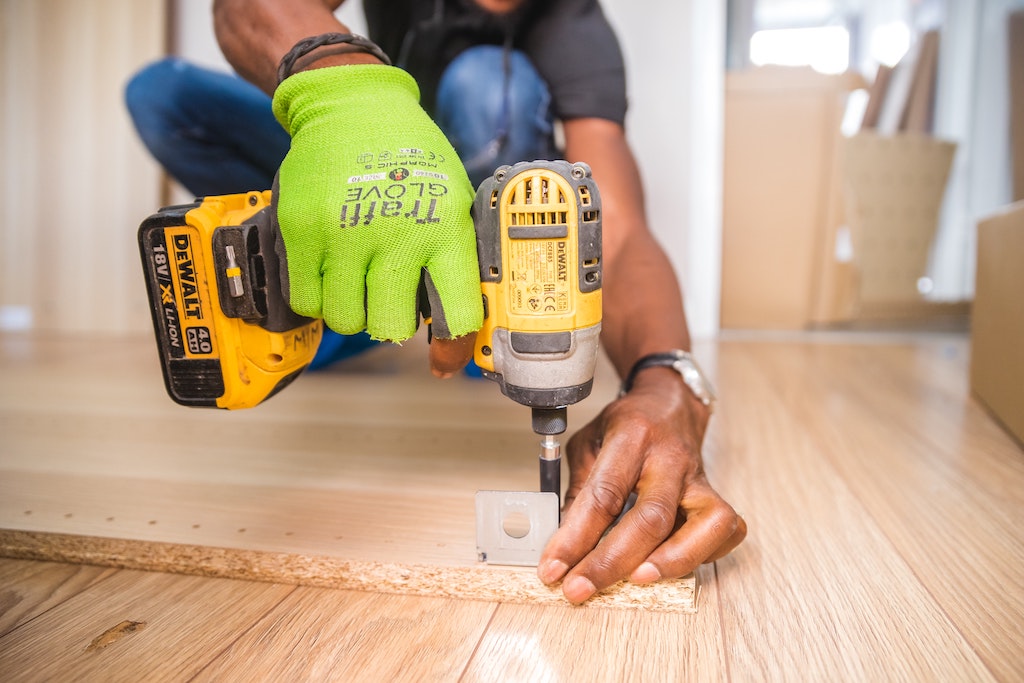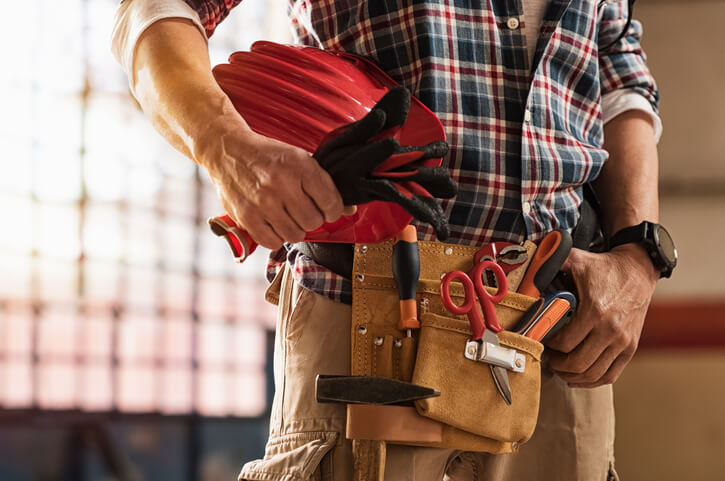Whether you’re a homeowner or a business owner, there will come a time when you need to call a handyman to fix something that’s broken or to perform maintenance on your property. However, before you pick up the phone and call the first handyman you find, it’s important to know what to look for and what to expect. In this article, we’ll share some essential tips and advice to help you choose the right handyman for your needs and explain what you should know before inviting them into your home or business. So, whether you’re a DIY enthusiast or simply looking to get a job done quickly and professionally, read on to find out more.
What does a handyman do?
A handyman is a skilled worker who can perform a wide range of maintenance and repair tasks in homes, commercial buildings, and other structures. They are often called upon to handle small to medium-sized projects that don’t require the expertise of a licensed contractor. The specific tasks that a handyman can perform vary depending on their skillset and experience, but some of the most common tasks include:
- General maintenance and repairs: Handymen can handle various tasks, such as fixing leaky faucets, repairing damaged drywall, painting, and replacing light fixtures.
- Carpentry: Many handymen have experience in carpentry and can build shelves, install crown molding, and repair furniture.
- Plumbing: Handymen can replace faucets, fix leaky pipes, install toilets, and perform other basic plumbing tasks.
- Electrical work: Handymen can replace electrical outlets, install ceiling fans, and perform other basic electrical tasks.
- Landscaping: Some handymen have experience in landscaping and can mow lawns, trim bushes, and perform other basic landscaping tasks.
- Assembly: Handymen can assemble furniture, install shelving, and hang pictures.
- Cleaning: Some handymen offer cleaning services, such as window washing, gutter cleaning, and power washing.
A handyman is a versatile worker who can perform a variety of tasks around the home or office. They are often called upon to handle small to medium-sized projects and provide an affordable alternative to licensed contractors for basic maintenance and repair tasks.
Things to consider before talking to a handyman
When there comes a point where you may need to call a handyman to tackle a project that you cannot do yourself, there are some important things to know before you call a handyman.
Determine the type of job you need
When determining the type of job you need, it’s important to consider the scope and complexity of the task at hand. Some jobs may require a handyman with advanced skills and specialized tools, while others may be more straightforward and require less expertise.
Here are some factors to consider when determining the type of job you need:
- The nature of the problem: Is it a plumbing, electrical, carpentry, or painting issue? Determining the specific area of expertise required will help you find the right handyman for the job.
- The complexity of the task: Is the job simple, such as changing a light bulb, or more complex, such as installing a new ceiling fan? This will determine the level of expertise and experience required for the job.
- The time and resources needed: Does the job require specialized tools or materials? Does it require more time than you’re willing to invest? Consider these factors when determining the type of job you need help with.
- Safety considerations: Some jobs, such as electrical or plumbing work, can be dangerous if not done properly. Hiring a handyman with the right skills and experience can help ensure the job is done safely.
- Your budget: Different handymen may have different rates depending on their level of expertise and the complexity of the job. Consider your budget when determining the type of job you need help with.
Once you have determined the type of job you need, it’s important to do your research and find a reliable and experienced handyman who can get the job done right. Check their reviews and references, and make sure they have the necessary licenses and insurance to work in your area. With the right handyman, you can get your home repairs and maintenance tasks done quickly and efficiently.
Research your options
Researching your options is important in finding the right handyman for the job. Here are some tips to help you with your search:
- Ask for recommendations: Reach out to friends, family members, or colleagues who have used a handyman in the past. They can provide you with valuable information about their experience with the handyman and whether or not they would recommend them.
- Search online: Use search engines and online directories to find handymen in your area. Many handymen have websites or social media profiles that you can visit to learn more about their services and credentials.
- Check reviews: Read online reviews from previous customers to get an idea of their experience with the handyman. Look for patterns in the reviews to see if there are any recurring issues or areas of concern.
- Check credentials: Ensure the handyman you are considering has the necessary licenses and insurance to work in your area. This will help protect you in case of any accidents or damage that may occur during the job.
- Ask for references: Once you have narrowed down your list of potential handymen, ask for references from previous customers. Contact these references and ask about their experience with the handyman, including the quality of their work, communication skills, and overall professionalism.
By researching your options, you can find a reliable and experienced handyman who can help you with your home repairs and maintenance tasks.
Check for licensing and insurance
Checking for licensing and insurance is a crucial step in hiring a handyman. Here’s why:
Licensing:
- Ensures competency: A licensed handyman has the necessary skills and training to complete the job. They have undergone a rigorous training process and passed exams to prove their knowledge and competency.
- Protects you: Hiring a licensed handyman means that you are protected against shoddy workmanship or incomplete jobs. If the work is not up to standard, you can file a complaint with the licensing board and take legal action if necessary.
- Provides peace of mind: Knowing that the handyman you’ve hired is licensed can provide peace of mind. You can trust that they know what they’re doing and will complete the job to your satisfaction.
Insurance:
- Protects your property: If something goes wrong during the project and your property is damaged, insurance can help cover the costs. Without insurance, you could be liable for the damages.
- Protects the handyman: Accidents can happen, and insurance can protect them if the handyman is injured on your property. You could be liable for their medical expenses and lost wages without insurance.
- Demonstrates professionalism: A handyman with insurance demonstrates professionalism and a commitment to their work. It shows that they take their job seriously and are willing to invest in protecting their clients.
When hiring a handyman, always ask for proof of licensing and insurance. Don’t be afraid to verify the information with the licensing board or insurance company. By doing your due diligence, you can protect yourself and your property, and ensure that the handyman you hire is qualified and professional.
Get multiple quotes
Getting multiple quotes is an important step in hiring a handyman. Here’s why:
- Ensures a fair price: Getting multiple quotes allows you to compare prices and ensure that you get a fair price for the job. Without multiple quotes, you may be overcharged or undercharged for the work.
- Helps you avoid scams: If one handyman’s quote is significantly lower than the others, it may be a red flag that they’re trying to scam you. By getting multiple quotes, you can identify any suspicious quotes and avoid scams.
- Allows you to compare services: Getting multiple quotes also allows you to compare the services offered by each handyman. You may find that one handyman offers additional services or has a better warranty than another, which can help you make an informed decision.
- Provides negotiating power: If one handyman’s quote is higher than the others, you can use the other quotes as negotiating power to try and get a lower price.
When getting multiple quotes, be sure to provide each handyman with the same information about the job. This will ensure that the quotes are comparable and that you’re making an apples-to-apples comparison. Also, be sure to ask for a breakdown of the quote so that you can see exactly what is included in the price.
Overall, getting multiple quotes is an important step in hiring a handyman. It ensures that you’re getting a fair price, allows you to compare services, and provides negotiating power.
Ask about their experience
When asking about a handyman’s experience, be sure to ask about specific job types that are relevant to your project. This will give you a better idea of their level of expertise in the area you need help with. Also, ask for references or examples of previous jobs they’ve completed that are similar to yours.
Overall, asking about a handyman’s experience is an important step in the hiring process. It can help ensure that you’re hiring someone with the necessary skills and expertise to complete your project successfully.
Get a written estimate
When getting a written estimate, be sure that it includes a detailed breakdown of the costs and what is included in the price. This should include any materials or supplies that will be used and labor costs. Also, be sure to ask for an estimated timeline for the project so that you have an idea of when it will be completed.
- Avoids misunderstandings: A written estimate ensures that there are no misunderstandings about the cost or scope of the project. It sets clear expectations for both you and the handyman and helps to prevent any surprises down the line.
- Protects against changes: A written estimate can help protect you against unexpected project scope or cost changes. If the handyman tries to make changes or charge additional fees later on, you can refer back to the written estimate and ensure that you’re only paying for what was originally agreed upon.
- Provides documentation: A written estimate serves as documentation of the agreement between you and the handyman. This can be helpful in case of any future dispute or misunderstanding.
Overall, getting a written estimate is an important step in the hiring process for a handyman. It ensures that there are no misunderstandings, protects against unexpected changes, and provides documentation of the agreement.
Discuss the payment structure
Discussing the payment structure with the handyman before the job begins is important. Find out how much you will need to pay upfront and when the final payment will be due. Also, ask about any additional costs that may arise during the project.
Hiring a handyman can save you time and money on home repairs and maintenance. By knowing what to expect before you call a handyman, you can ensure you get the best service possible. Remember to define the problem, ask for recommendations, verify insurance and licensing, get a written estimate, check for guarantees and warranties, communicate clearly, be prepared, and schedule ahead of time. By following these tips, you can make your experience with a handyman as smooth and successful as possible.




